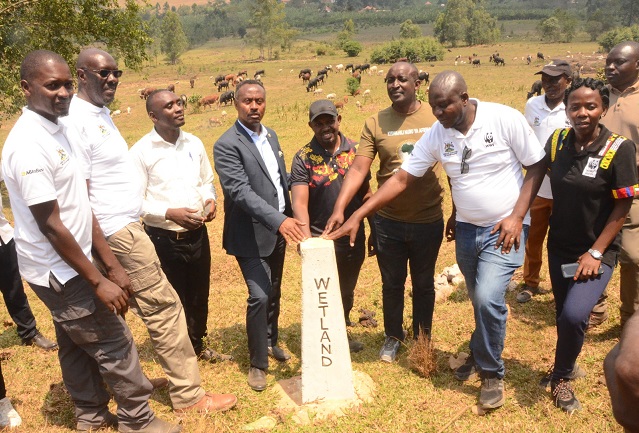
Mbarara, Uganda | THE INDEPENDENT | Nile Breweries Limited (NBL), in collaboration with World Wide Fund Uganda (WWF), has today (Aug.8) announced the successful demarcation and restoration of 15 kilometers of the Kibaale Wetland within the Kakigani micro-catchment area along River Rwizi.
The Kibaale Wetland, a key tributary and one of the largest wetlands feeding River Rwizi, plays a critical role in the water system of southwestern Uganda.
Spanning 84 hectares and stretching approximately 25 kilometers, the wetland has faced significant degradation over the years due to unregulated activities such as sand mining, brick- making, and farming. However, recent restoration efforts are showing promising results.
Emmanuel Njuki, legal and corporate affairs lead at NBL, emphasized the early signs of ecological recovery. He noted that natural regeneration is already visible, and communities are increasingly recognizing the importance of wetland conservation. “Wetlands are vital—they support food production, purify water, and replenish groundwater systems. Their health is directly connected to our well-being,” Njuki said.
The restoration efforts are aligned with the Rwizi Catchment Management Plan, a guiding framework for sustainable water and environmental interventions in the region. Njuki reaffirmed the company’s commitment to the long-term health of River Rwizi, a vital water source for millions in Mbarara District.
He highlighted several ongoing initiatives along the river buffer zone, including soil and water conservation, agroforestry, installation of rainwater harvesting tanks, riverbank and wetland restoration, and support for alternative income-generating activities for nearby communities.
As part of the broader rehabilitation initiative, NBL recently installed 13 additional concrete rainwater harvesting tanks, bringing the total to 22 across six villages in the Kakigani micro- catchment area of Rwampara District.
Each tank holds 10,000 litres and serves around 10 households, improving water access for more than 1,000 residents in Rutooma, Kanyangi, Biti, Kitookye, Karagwe, and Kacucu.
“These tanks collect rainwater from rooftops, reducing stormwater erosion while easing the burden on school-going children who used to walk long distances to fetch water,” Njuki added. “Now, with clean water nearby, children can attend school more regularly.”
To evaluate the effectiveness of these interventions, two water monitoring stations have been installed downstream of the restoration sites. These stations provide continuous, reliable data on water flow and quality, enabling evidence-based decisions and real-time environmental tracking.
Further supporting accessibility and flood control, a new box culvert has been constructed at Ndeija Wetland in Kiremba, Rwampara District.
This structure replaces a previously impassable road section that was frequently submerged during rainy seasons.
“The flooding often isolated communities from essential services like schools, markets, and health centers,” said Njuki. “The new bridge now allows safe access while channeling floodwaters into the wetland. It’s a win for both people and nature and helps us achieve our objective of improving water quality and quantity in the River Rwizi system.”
Since 2019, Nile Breweries Limited and WWF have worked together on a comprehensive restoration program aimed at addressing water security issues in the Rwizi catchment. “By 2025, we aim to ensure that all communities in high-stress areas under our program have seen measurable improvements in water availability and quality,” Njuki said.
Ivan Tumuhimbise, country director of WWF Uganda, echoed these sentiments.
“River Rwizi is a lifeline for both people and biodiversity in southwestern Uganda. The restoration of Kibaale Wetland is revitalizing this crucial river system while also enhancing community livelihoods,” he said.
He added: “WWF Uganda is proud to partner with Nile Breweries Limited in this shared mission to restore ecosystems, strengthen water security, and support sustainable development. Our dedication to protecting River Rwizi for current and future generations remains unwavering.”
 The Independent Uganda: You get the Truth we Pay the Price
The Independent Uganda: You get the Truth we Pay the Price





